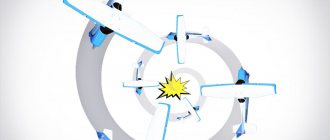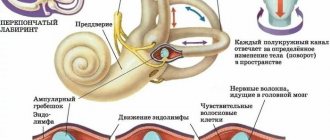Mechanism of development of vertigo
If we consider dizziness from an anatomical point of view, the causes of this condition are quite simple. The vestibular apparatus, responsible for human balance and coordination in space, is located in the inner ear. Vision and muscle reflexes help a person navigate the environment. All received information enters the brain. And it is he who controls the functioning of the vestibular apparatus.
Sometimes the connection between the inner ear and the brain can become disrupted. A person loses the ability to navigate in space. Dizziness appears. To restore the lost connection, the brain immediately launches several reactions at once. Some of them may affect neighboring centers (for example, emetic). This leads to the appearance of unpleasant accompanying symptoms.
Sudden dizziness: 5 simple reasons
Typically, loss of communication between the brain and the vestibular system is rare and does not last long.
Dizziness that occurs is not considered a pathology in the following cases:
- Ride the carousel. Such entertainment creates a serious load on the vestibular apparatus. And if it is naturally weak and untrained, then it may well fail. Such dizziness usually occurs in women, since they also have psycho-emotional experiences added to the load.
- Stress, anxiety. If dizziness occurs during a speech in front of a large audience or after a reprimand from a boss, then the cause of vertigo is the production of a large amount of adrenaline. This hormone causes vasospasm. And this leads to a temporary deterioration in blood flow in the brain.
- Climbing to heights. In this case, the unpleasant phenomenon is also considered a physiological norm. When rising to a height, a person’s eyes cannot quickly focus on distant and close objects. Abrupt switching between objects causes dizziness.
- Hunger. Similar problems are common to all fans of strict diets. If a person does not receive enough nutrition, then a glucose deficiency occurs in his body. The absence of the main “fuel” leads to deterioration of brain function and the appearance of dizziness.
- Active exercises. Exercise enthusiasts should remember moderation. Excessive exercise can cause low blood pressure. This leads to dizziness and sometimes fainting. The unpleasant condition may be caused by unsuccessful sudden movements of the head, as a result of which the blood supply to the brain is disrupted.
An attack of dizziness may occur in response to taking certain medications. The most common sources of unpleasant symptoms are NSAIDs, antidepressants, antibiotics, and cancer medications. If your head is “turned” by medications, be sure to consult a doctor to change the drug.
Causes of the pathogenic condition
The content of the article
Symptoms that are not due to disease.
If you suddenly feel dizzy and nauseous, do not be afraid. Usually the reasons for this condition are:
- a person spun on a carousel, swung on a swing, or was at a height for a long time;
- a person eats poorly, goes hungry and is on the wrong diet;
- thoughts are confused;
- stress and nervous environment;
- long stay in an unventilated and stuffy office;
- magnetic storms;
- taking medications and vitamins without consulting a doctor;
- got sick in the car;
- seasickness.
Causes of the pathogenic condition in girls.
Women have an unstable emotional and hormonal state, unlike men. They often go on diets, fast, and do fasting days to lose weight and maintain body shape.
As a result of such activities, their glucose levels decrease, frequent dizziness begins, digestive ailments worsen, and hair falls out, which leads to stress and depression.
Dizziness in women is possible only if they are pregnant, have recently been under stress, premenstrual syndrome is about to begin, or it is time for menopause.
Causes of nausea and dizziness associated with illness.
Severe dizziness and nausea lead to loss of coordination and balance. These anomalies indicate diseases:
- osteochondrosis of the cervical spine;
- injuries to the head, hearing organs and spine;
- migraine;
- inflammation of the middle ear (labyrinthitis);
- episyndrome;
- Meniere's syndrome;
- disruption of the circulatory system of the brain;
- brain tumors;
- alcohol intoxication;
- spinal cord diseases;
- infections and meningitis;
- perilymphatic fistula;
- stroke.
An ambulance should be called if the patient, in addition to nausea and dizziness, experiences:
- fainting;
- vomit;
- elevated temperature;
- cardiopalmus;
- tingling hands;
- darkening of the eyes;
- ears began to hear poorly;
- dizzy after lying down for more than an hour;
- grainy image;
- pallor.
Pathogenic condition due to vegetative-vascular dystonia.
Staggering while walking, objects that “float”, nausea, anxiety, confusion of thoughts, a feeling of extreme hunger and lack of oxygen in the brain (the head is pressed from all sides) and dizziness are indicators of vegetative-vascular dystonia.
When you suddenly and abruptly change your body position, you begin to feel dizzy for a short period of time, and your health worsens due to the fact that the vessels do not have time to deliver a sufficient volume of blood to the brain.
Causes of pathogenic conditions that occur in the dark
. Systems such as the visual, vestibular, proprioceptive, and cerebral systems collectively regulate our balance. But if at least one of them has a disruption in the functioning of the organ, then dizziness will begin at night.
Causes of the pathogenic condition in a patient with diabetes mellitus.
During attacks, a patient with diabetes experiences chills, dizziness and nausea. This can lead to fainting or even coma. To avoid such symptoms, you need to get tested in advance, take the right amount of insulin or take medications, follow your diet and measure your sugar more often.
What to do if you feel dizzy and feel nauseous
Independent actions in case of dizziness and nausea:
- do not make quick movements, restore breathing;
- look at one specific object;
- drink cold water with a small piece of sugar;
- in case of strong emotional stress, drink a sedative or tea with oregano or chamomile;
- when your blood pressure drops, drink strong brewed black tea with chocolate (important: green tea, on the contrary, lowers blood pressure);
- if you have hypoglycemia (diabetics), eat candy with a lemon or mint flavor, or a piece of sugar, wash it down with warm tea;
- go outside or ventilate the room;
- if you start to feel very sick and everything around you is spinning, then you need to bend over and let your head go between your knees.
If the advice does not help, immediately call 003.
Severe dizziness: 6 pathological causes
The causes of dizziness are not always harmless. Sometimes illnesses become sources of unpleasant conditions. In this case, dizziness occurs quite often and can last longer than a few seconds. To cope with this phenomenon, you need to consult a doctor. The severity of a symptom can be reduced (and sometimes completely eliminated) only through proper treatment of the underlying disease.
So, the causes of dizziness may include the following pathologies:
- Vegetovascular dystonia (VSD). A complex disorder in which a person experiences multiple impairments. All these symptoms are associated with malfunctions of the autonomic system. One of the common signs of VSD is dizziness. Such attacks are usually caused by sudden movements and rapid changes in posture. Dizziness does not last long. They go away on their own, without any intervention.
- Disorders in the cervical spine. Various injuries, osteochondrosis, intervertebral hernias can periodically remind you of themselves with sudden attacks of dizziness. They usually appear after active neck movements. The attack is accompanied by pain in the affected area, sometimes a crunching or crackling sound is heard.
- Anemia. Dizziness may occur due to iron deficiency. Most often this pathology is observed in children and women. With anemia, attacks are accompanied by high fatigue, weakness, pale skin, and pre-fainting conditions.
- Psychogenic dizziness. The reason for this pathology lies in the patient’s increased anxiety (people with an unstable psyche) or in the stress they have endured. Such people usually complain of poor sleep, fear of losing consciousness, a periodic feeling of shortness of breath, and increased heart rate.
- Vertebrobasilar insufficiency. This is a pathology in which blood flow in the vertebral or basilar arteries is weakened. Such problems lead to disruption of brain function. The pathology is characterized by regular attacks of dizziness, which can last up to an hour. In addition, patients complain of nausea, vomiting, and visual disturbances may occur. I often have a headache.
- Hypotension. A decrease in blood pressure is often accompanied by attacks of dizziness. Sometimes lightheadedness may occur.
Main types of illness
A healthy person may become dizzy when exposed to a strong external irritant. Malaise can occur while skating or a carousel, while the human body cannot independently control the force of rotation. Dizziness can be divided into the following forms:
- Vestibular (otherwise known as vertigo). This form of dizziness is called true, in this case a person feels the movement of all objects that are near him, in some cases you can feel the movement of your body.
- Collaptoid. Occurs when there is a sudden change in body position or pressure that is applied to the head. At this moment, a person has a desire to take a horizontal pose as soon as possible.
- Age. Occurs in older people due to imbalance. In this case the symptom is not true.
- Conditions that are often confused with dizziness (severe fatigue, stress, neurological problems, etc.). In this case, the patient begins to complain of characteristic pain in the heart and fear of dizziness.
Severe dizziness: 6 dangerous reasons
In some cases, vertigo signals the development of severe conditions that require immediate medical attention. Causes of severe dizziness may include:
- Labyrinthitis (internal otitis). A viral infection in the inner ear may be asymptomatic at first. The only sign of otitis media is dizziness, which lasts for several minutes. Such attacks are repeated quite often. In the future, the viral process can affect the nervous system or brain.
- Concussion. Sometimes after a head injury, only dizziness appears. This symptom should not be ignored. It serves as direct evidence of a concussion. To eliminate the risk of swelling or serious brain damage, you should immediately seek medical help.
- Stroke. If dizziness is accompanied by sudden weakness, complaints of numbness of a body part, visual impairment, speech disturbances, then the risk of stroke is high. This is a severe pathology in which blood circulation in the brain is disrupted.
- Migraine. Dizziness accompanied by a severe headache may indicate a migraine. Many people believe that this condition is harmless. But doctors say that migraine, especially in an advanced state, can lead to severe damage (sometimes even to a heart attack or stroke).
- Cardiovascular diseases. Such pathologies are characterized by the appearance of dizziness every time a person gets up. It is caused by a sharp decrease in pressure. Symptoms like these may indicate dehydration, which is causing your blood to thicken. But if the problem is not fluid deficiency, then it may be the development of arrhythmia or heart failure.
- Tumors. Regular attacks of vertigo combined with headaches, usually in one side of the head, can signal the development of a tumor in the brain.
Structure and functions of the inner ear
Rice. 2. Ear structure
Anatomy of the ear
The inner ear includes a system of tubes and sacs that are filled with fluid. All this is called a labyrinth, the functions of which are hearing and balance. Sound signals from the labyrinth are transmitted to the brain through the vestibulocochlear nerve with two branches. One transmits messages from the organ of hearing, and the other from the organs of balance.
The brain processes balance signals sent through the vestibular nerve from the right and left ears. When one side is infected, it sends false signals. This is how information is presented that does not correspond to reality, which leads to dizziness.
Vestibular neuritis
(nerve inflammation) affects the branch associated with balance. This leads to dizziness, impaired sense of self in space, sudden movement of the eyeballs with a rapid phase, but no transformations with hearing occur. A person may feel like objects around them are moving, and will usually make mistakes when performing coordination exercises.
Experts also use the term “vestibular neuronitis” (damage to the sensory neurons of the vestibular ganglion). Its symptom is severe, rapidly developing, paroxysmal dizziness. It is often characterized by vomiting and imbalance. Often the development of symptoms of dizziness
precedes ARVI. Sometimes, a few weeks before the full clinical picture, patients may experience short bouts of loss of balance.
Labyrinthitis (inflammation of the labyrinth)
occurs when infection affects both branches of the cochleo-vestibular nerve. Then the hearing changes and attacks of dizziness occur. Even with slight turns of the head, the symptoms become more pronounced. Therefore, some people are forced to support their head with their hands.
Benign paroxysmal positional vertigo (BPPV)
BPPV is one of the most common causes of dizziness
, manifested during sudden movements and head swings. The duration of the state is limited to a few seconds or minutes. It occurs when calcium crystals (otoliths) in the inner ear begin to move. Because of this, the sensation of body rotation occurs.
The causes of BPPV include a history of traumatic brain injury, as well as otitis media. Often the cause of the disease cannot be identified. Then the diagnosis is confirmed by taking a Dix-Hallpike test. To do this, the patient quickly lies down from a sitting position and slightly lowers his head, turned 45 degrees. The test is positive if, a couple of seconds after this, an attack of dizziness and nystagmus occurs.
From 20 to 28% of patients with BPPV report spontaneous resolution of symptoms within up to a month after the onset of dizziness. The disease is benign and recurs within the first 12 months in only 15% of cases.
Rice. 3. Dix-Hallpike test: A – turn the head to the right; B - turn your head to the left.
Treatment of BPPV
Treatment techniques include the Epley maneuver. It allows, by manipulating the head, to move the otolith (crystal) to an insensitive zone - the vestibule of the inner ear.
Rice. 4. Epley maneuver
If the effectiveness of such treatment is low, the patient is additionally prescribed a set of exercises to perform at home. This is Brandt-Deroff gymnastics, according to whose method it is necessary to practice 2-3 times a day for 1 to 3 weeks. Taking medications in this case usually does not give positive dynamics.
Rice. 5. Brandt-Daroff gymnastics
Operations are performed when repositioning techniques do not lead to anything. Surgical interventions carry the risk of complications such as facial nerve injuries and hearing loss.
Possible operations include:
- obstruction of the posterior semicircular canal;
- removal of the vestibular nerve;
- labyrinthectomy;
- selective neurectomy.
Meniere's disease
A disease characterized by repeated attacks of rotational vertigo. They last for several hours and are not without noise in the ears, tinnitus, fullness or distension, as well as hearing impairment. It occurs in approximately 0.2% of the population, usually in people between 40 and 60 years of age. The disease is based on expansion of the endolymphatic system in the inner ear, which leads to degeneration of the labyrinthine receptors.
The disease has the following manifestations:
- dizziness;
- unsteady gait;
- hearing impairment;
- problems with the perception of sounds;
- nausea and vomiting;
- tinnitus.
Treatment of Meniere's disease
Treatment of an attack occurs by taking vestibulosuppressors. Prevention of the disease necessarily includes following a low-salt diet, avoiding alcohol and caffeine, and using betahistine and diuretics.
If the chosen therapy does not lead to positive dynamics, more serious treatment is required. This may involve injecting medications directly into the ear or undergoing surgery.
Diagnosis for dizziness
For dizziness, patients undergo Halmagi tests to identify the level of the vestibulo-ocular reflex. Its violation indicates central and peripheral lesions.
The Halmagi test does not require the use of additional equipment or lengthy preparation. The patient needs to look at the bridge of the nose of the specialist who is sitting opposite. In this case, the doctor holds the patient’s head with both hands and turns it from side to side by 15 degrees. With a normal vestibulo-ocular reflex, the eyes remain looking at a given point. If there is a violation, then the gaze turns along with the turn of the head.
Rice. 6. Halmagi sample
Severe dizziness with repeated bouts of vomiting continues for up to 3-4 days, after which the patient recovers. Recovery can take up to several months. In older people, it usually drags on and is often incomplete. If positive dynamics are not observed within a month, then an MRI of the brain and audiometry should be performed to exclude Meniere’s disease.
What to do?
It is almost impossible to independently determine the causes of frequent attacks of dizziness. Therefore, those who regularly experience vertigo are advised to go to an appointment with a therapist, or a neurologist. The specialist will carefully examine the patient’s complaints and prescribe diagnostic tests. If necessary, the doctor will refer the patient for consultations with an ENT specialist, an ophthalmologist, a cardiologist, or an endocrinologist.
To identify the causes of vertigo, the patient may be prescribed the following tests:
- Neurological tests. They allow you to assess the functionality of the vestibular apparatus.
- MRI or CT. Such brain studies reveal various disorders (hemorrhages, tumors, vascular pathologies).
- Ultrasound Doppler. Using Doppler ultrasound, the condition of the vessels of the head and neck is studied.
- Audiometry. Diagnostics allows us to assess hearing function.
- EEG. To study the activity of the cerebral cortex, the doctor will prescribe electroencephalography.
To quickly cope with dizziness (of course, if it is not caused by dangerous reasons), you can sit on any surface, relax a little and take 5-6 deep breaths. Be sure to open the window (if you are indoors) to provide fresh air. If the causes of vertigo are harmless, then such actions are quite enough for the dizziness to disappear without a trace.











